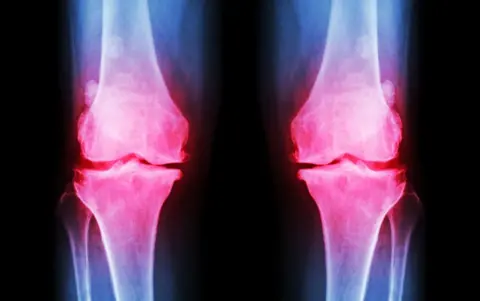Osteoarthritis study could lead to new treatments
 NHS
NHSMore than 900 genetic links to osteoarthritis, including 500 which have never been reported, have been uncovered in a research study in Sheffield.
Sheffield Teaching Hospitals NHS Foundation Trust said the "landmark" global study into osteoarthritis was the largest of its kind.
The degenerative condition affects around 595 million people globally, and is the leading cause of disability and chronic pain worldwide, according to the hospital trust.
The genome study used genetic information from nearly two million people, and was published in the journal Nature.
 Getty Images
Getty ImagesLed by Helmholtz Munich, the largest scientific research organisation in Germany, genetic codes and DNA of almost half a million osteoarthritis sufferers globally - including 1,000 volunteers from Sheffield - were compared with that of 1.5 million people without the disease, the trust said.
The team identified 962 genetic variations more commonly found in those with osteoarthritis; more than 500 of which had not previously been identified, it said.
The number osteoarthritis sufferers was predicted to rise to a billion people by 2050 and despite the impact "no disease-modifying treatments are currently available", researchers said.
However the new work "paves the way for potential new drug treatments and personalised therapies," they continued.
'Repurpose existing treatments'
Prof Mark Wilkinson, Honorary Consultant Orthopaedic Surgeon at the trust and the University of Sheffield, said the findings were "hugely important" and would "open up exciting new avenues" for millions.
"As well as identifying potential drug targets and opportunities for us to repurpose existing treatments that already target these genes in other conditions, this research has also significantly advanced our understanding of the underlying biological mechanisms associated with the disease," Prof Wilkinson said.
Eight biological processes which regulate the body's internal systems and cell function were found, "shedding light on the disease's biological mechanisms", the trust said.
Some of these genes contain proteins already targeted by drugs approved for other conditions, which could accelerate treatment development, it added.
Listen to highlights from South Yorkshire on BBC Sounds, catch up with the latest episode of Look North.
